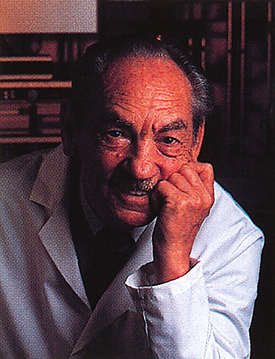Nobel Prize winner George Hitchings dies at 92
 George Hitchings, ’27, ’28, who won the Nobel Prize in Medicine in 1988 for pharmaceutical research that led to the creation of drugs to treat leukemia, gout, malaria and disorders of the human immunity system and that eventually made organ transplants possible, died Feb. 27 at his home in Chapel Hill, N.C. He was 92.
George Hitchings, ’27, ’28, who won the Nobel Prize in Medicine in 1988 for pharmaceutical research that led to the creation of drugs to treat leukemia, gout, malaria and disorders of the human immunity system and that eventually made organ transplants possible, died Feb. 27 at his home in Chapel Hill, N.C. He was 92.
For more than three decades, Hitchings was the chief researcher and biochemist with the Burroughs Wellcome Co. (now Glaxo Wellcome) in Research Triangle Park, N.C. He worked most of his career with Dr. Gertrude Elion, and their work led to the development of important drugs such as AZT, which is used to treat AIDS.
Scientists have estimated that Hitchings’ work-including the development of drugs like lmuran, which blocks the immune response that triggers rejection of foreign tissues, making organ transplants possible-has saved more than a million lives.
“He revolutionized the world of drug exploration and design,” said Robert A. Ingram, chief executive of Glaxo Wellcome.
Hitchings was born on April 18, 1905, in Hoquiam. The son of a shipbuilder and community leader, Hitchings became interested in medicine after his father died when he was only 12. He received his bachelor’s and master’s degrees (both in chemistry) from the UW, and a doctorate in biochemistry from Harvard in 1933.
He wrote or was the co-author of more than 300 published papers and was responsible for 89 U.S. patents. He was also involved in charitable organizations, serving as president of the Burroughs Wellcome Fund, which supports academic research, and the Red Cross.
He received numerous honors for his work, including the 1986 Alumnus Summa Laude Dignatus, the highest honor presented by the University of Washington and the UW Alumni Association.